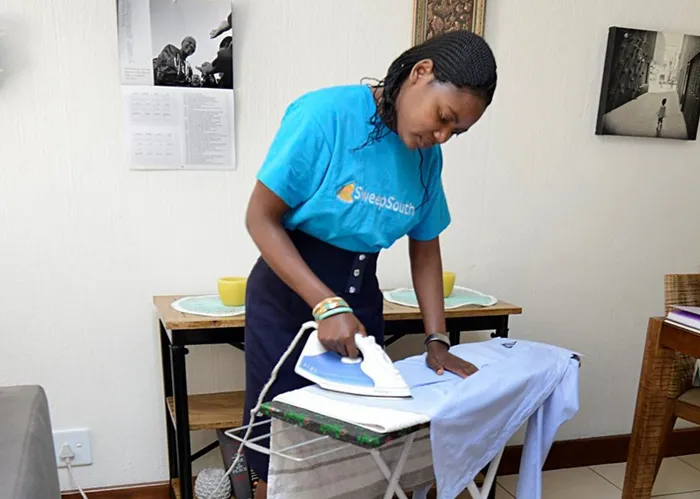Domestic workers: The silent struggle of breadwinners in South Africa

Understanding the key statistics of South Africa's domestic work sector is crucial, but the numbers alone don't reveal the daily realities faced by those employed in this field.
Image: File / Paballo Thekiso
A RECENT survey has shown that the overwhelming majority of the country's domestic workers were breadwinners in their families, which placed them in a precarious position.
Due to their desperate need to remain employed and provide support for families, they inevitably prefer to suffer in silence and contend with being underpaid, exploited and abused.
The 8th annual SweepSouth Report on Domestic Worker Pay and Working Conditions, released on Sunday, details the financial pressure domestic workers have faced over the past year.
The latest findings will be shared with the Department of Labour and other government stakeholders to help shape policies when it comes to the National Minimum Wage.
Based on a survey of more than 5,000 domestic workers across the country, the report found that 82% of respondents were breadwinners, and 58% supported an average of four dependents, yet their earnings have not kept pace with the rising cost of living.
While the average hourly wage exceeded the R28.79 National Minimum Wage, 39% of domestic workers still earned below that threshold. Their overall expenses rose by 7% since 2023: rent or bond payments increased by 11%, food by 8%, and electricity by 7%.
The average monthly cost of living stood at R4,500, leaving many households operating on razor-thin margins.

Lourandi Kriel, is the CEO of SweepSouth, a web-based platform for booking cleaning and caregiving services
Image: Supplied
Lourandi Kriel, CEO of SweepSouth, a web-based platform for booking cleaning and caregiving services, said the report offered a sobering snapshot of life for domestic workers.
“It gives us the evidence we need to stop guessing,” said Kriel. “When you see that the median take-home pay is around R3 635, nearly R900 short of basic living costs, it’s no longer an abstract issue. It’s a reality. That allows us to design better solutions, whether that’s financial products to help workers get out of debt or training programmes that create new career pathways. It also means we can take something concrete to policymakers and domestic employers and say: here’s where the gap is, let’s fix it.”
The SweepSouth report has become an influential resource in shaping labour policy.
“We’ve shared past reports with the Department of Labour, Treasury, and other stakeholders within government who are involved in setting minimum wage policy,” said Kriel. “What’s encouraging is that these conversations are moving from ‘nice to have’ to urgent. Policymakers are recognising that without credible data, it’s hard to design interventions that work. That’s where this survey really adds weight.”
Among the key findings were:
1 in 3 domestic workers reported being in debt, with 35% describing their situation as “hopeless.” Nearly half owed money to shops, highlighting a growing reliance on informal credit.
1 in 5 experienced job loss due to employer relocation, adding further instability to an already precarious employment landscape.
1 in 5 reported feeling unsafe in their employer’s home, citing experiences of verbal, physical, and sexual abuse.
1 in 6 reported a decline in mental well-being over the past year, with women more affected than men. Key stressors included unemployment, financial pressure, and family issues.

The 8th Annual Sweepsouth report details the extent to which workers continue to sacrifice basic needs as costs outstrip earnings. Picture: Pexels.com.
Image: File
The survey was distributed during June and July 2025 and conducted via SMS and WhatsApp to a broad sample of domestic workers between.
The majority of respondents (92%) were women between the ages of 26 and 41, with an average age of 38. A significant proportion of participants were foreign nationals, with 64% identifying as Zimbabwean, 2% as Malawian, 1% from Lesotho, and 31% as South African.
In terms of regions, 57% of respondents worked in Gauteng, 38% in the Western Cape, 4% in KwaZulu-Natal, and 1% in other areas. Workers based in Gauteng and the Western Cape reported the highest wages overall, while foreign nationals earned, on average, approximately R3 more per hour than their South African counterparts.
For the majority, financial security remains out of reach. Seventy-two percent said they didn’t earn enough to save, 13% had some form of savings or pension, 17% participated in stokvels, and only 1% had medical aid. However, end-of-life costs have been prioritised over long-term savings or healthcare, with 57% having funeral plans.
Domestic workers were also keen on pursuing education, showing potential for upward mobility. Forty-three percent had completed high school, and 18% had post-secondary education. Thirty-nine percent were studying through institutions, or self-study, while 86 % said they would want to study if they had the money and time.
When it came to employment trends and career aspirations, 85% of domestic workers were part-time employees working across multiple households; only 15% had full-time roles, 87% focused on cleaning, 6% on gardening, 3% on childcare, and 2% on elderly care.
Related Topics: